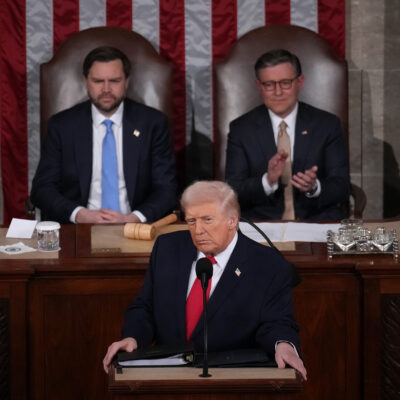
Johannes Neudecker/dpa via Getty Images
Is a shift in China’s rhetoric on Israel a policy change, or ‘wishful thinking?’
Beijing refers to Israel’s ‘reasonable security concerns’ for the first time in nearly a year, leading experts to debate whether China is becoming less hostile to Israel
A recent, slight shift in the Chinese Communist Party’s rhetoric has Beijing watchers in Israel wondering if the IDF’s successes in Lebanon are impacting China’s policies.
Chinese Foreign Ministry spokesperson Mao Ning commented on the anniversary of the Oct. 7 Hamas attacks on Israel in her press conference on Tuesday, saying that “the legitimate national rights of the Palestinian people need to be realized and the reasonable security concerns of Israel need to be paid attention to.”
For Westerners, this is regular diplomatic-speak. But a Bloomberg reporter in the room noticed something unusual and asked: “Did you mention … the legitimate security of Israel needs to be considered? Did I miss [something] here? … Has the ministry said this before?”
Mao repeated herself that “the legitimate national rights of the Palestinian people need to be realized and the reasonable security concerns of Israel need to be paid attention to,” and claimed that “it has been China’s consistent position.”
“China realized Israel might win and is therefore adjusting its stance, realizing that, in order to be in the Middle East, Beijing will need some level of decent relations with Israel,” Carice Witte, the executive director of SIGNAL Group, told JI.
Before the Hamas attack, Jerusalem and Beijing seemed close, with Israeli Prime Minister Benjamin Netanyahu planning to make an official visit in 2023. But in the weeks following Oct. 7, Israel-China relations took a sharp downturn. China did not condemn the massacre, refused to mention – let alone blame – Hamas, and accused Israel of going “beyond the scope of self-defense” even before it began its ground invasion of Gaza.
Now, Carice Witte, the executive director of SIGNAL Group, told Jewish Insider that Mao’s comments marked the first time China mentioned Israel’s “reasonable security concerns” in almost a year.
Since Israeli operations detonating Hezbollah terrorists’ pagers and killing the Lebanese terrorist organization’s leader Hassan Hasrallah, Witte said, “China realized Israel might win and is therefore adjusting its stance, realizing that, in order to be in the Middle East, Beijing will need some level of decent relations with Israel.”
One small sign of outreach from China to Israel was a recent Beijing-funded trip for four Israeli journalists and two think tank representatives, including one from SIGNAL, Witte said.
Witte pointed out some of China’s other recent actions that sent a different message. Chinese Foreign Minister Wang Yi called for peace in his speech to the U.N. General Assembly last month, which “rang hollow to the ears of Israelis who have watched Beijing refuse to label Hamas a terrorist organization and instead host Hamas in China.” His suggestion to have a peace conference at the U.N. is also viewed negatively in Jerusalem, Witte wrote, because “Beijing is well aware of the U.N.’s anti-Israel bias, in sync with Beijing’s 100% anti-Israel voting record.”
China wants to play a role in conflict resolution in the Middle East, and it already has good relations with the Iranian proxies attacking Israel, but it will need Israel’s buy-in.
Joseph Rozen, the former director of Asia-Pacific at Israel’s National Security Council for over a decade and currently a senior fellow at the Misgav Institute for National Security and Zionist Policy, said
“It’s a bit of wishful thinking to focus on this one nuance. I agree with the general view that China is always trying to find the opportunity to work with different parties, but it doesn’t mean there was a more dramatic shift in its position vis-a-vis Israel.”
Beijing does not want to be on the losing side of the war, Witte explained, and therefore is softening its statements about Israel.
“If Israel keeps winning, it will have the upper hand across many boards,” she said.
Joseph Rozen, the former director of Asia-Pacific at Israel’s National Security Council for over a decade and currently a senior fellow at the Misgav Institute for National Security and Zionist Policy, was skeptical that anything had changed with China, noting that Chinese officials used similar language soon after the Oct. 7 attack. (The writer of this story is also a senior fellow at the Misgav Institute.)
“It’s a bit of wishful thinking to focus on this one nuance,” Rozen told JI. “I agree with the general view that China is always trying to find the opportunity to work with different parties, but it doesn’t mean there was a more dramatic shift in its position vis-a-vis Israel.”
China seeks to be “a global player that can talk with everyone,” Rozen explained, but its “main interest is to compete with the U.S. Therefore, I try not to describe its position as anti-Israel, but more anti-American. They’re using the situation in the Middle East” to create problems for Washington.
Rozen also noted that the CCP does not mention Hamas or the Oct. 7 attacks in its statements, treating the past year as “another cycle of violence between Israel and the Palestinians.” Beijing even hosted representatives of Hamas and Fatah, the party that dominates the Palestinian Authority, last month to try to reconcile between them.
As such, Rozen said, the Chinese Foreign Ministry spokesperson’s remarks “could be a positive sign, but only if we see a balanced view in the next four or five official statements. Then I’d say it’s a slight change, but I would want to see some actions on the ground.”
“Is Beijing finally striking a balance? Not really, but it’s a welcome change,” Tuvia Gering, a fellow at the Institute for National Security Studies and the Atlantic Council, said. “Israel is still waiting for Beijing to condemn the Oct. 7 terror attack and Hamas, yet China has been too busy hosting Hamas in its capital and acting as its mouthpiece.”
“If China wants to contribute to global peace, they can stop delivering [arms] components to Russia and Iran,” he added. “I care more about actions.”
Tuvia Gering, a fellow at the Institute for National Security Studies and the Atlantic Council, shared Rozen’s skepticism.
“Is Beijing finally striking a balance? Not really, but it’s a welcome change,” Gering said. “Israel is still waiting for Beijing to condemn the Oct. 7 terror attack and Hamas, yet China has been too busy hosting Hamas in its capital and acting as its mouthpiece.”
Gering pointed out that rights for Palestinians were described as “legitimate,” while Israel’s security interests were called “reasonable.” Before Oct. 7, China also referred to Israel’s security interests as “legitimate,” but infrequently, he said.
He also noted on the anniversary of the Oct. 7 massacre that Chinese media was full of “one-sided coverage of Palestinian suffering while erasing Israel’s tragedy. It brands Israel’s actions as genocidal, irrational and illegal, thereby casting the U.S. as complicit.”
Please log in if you already have a subscription, or subscribe to access the latest updates.






